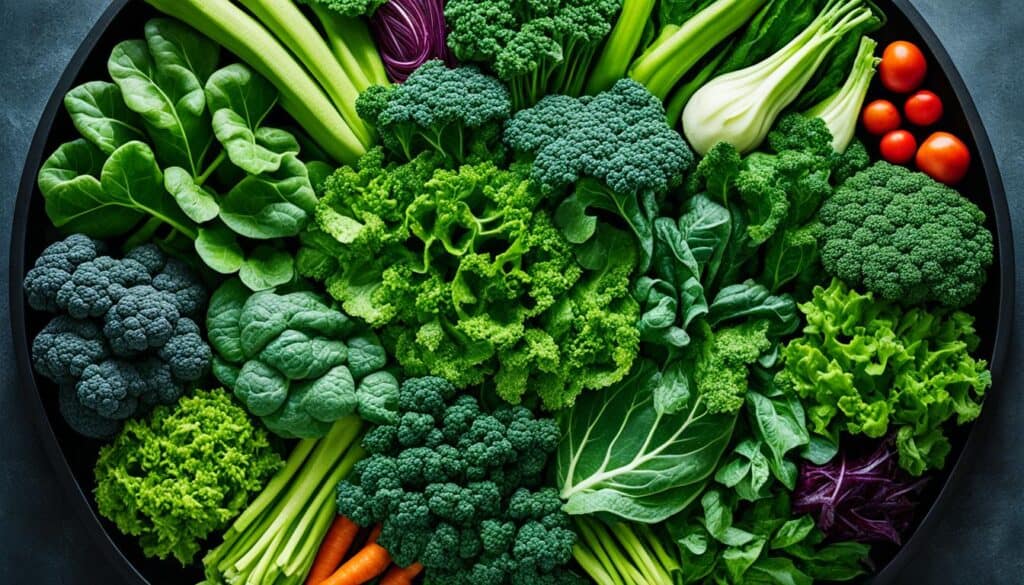Did you know that leafy green vegetables like spinach, kale, and Swiss chard are not only packed with essential nutrients, but they also contain a unique sugar molecule that helps feed good gut bacteria? It’s true! Recent research has uncovered the presence of a sugar molecule called sulfoquinovose (SQ) in leafy greens, which plays a crucial role in maintaining a healthy gut microbiota. This finding highlights the incredible impact that leafy greens can have on our overall well-being.
Key Takeaways:
- Leafy greens contain a sugar molecule called sulfoquinovose (SQ) that feeds good gut bacteria.
- Incorporating leafy greens into your diet can promote a healthy gut and overall well-being.
- Leafy greens are rich in essential nutrients like folate, lutein, zeaxanthin, beta carotene, and magnesium.
- Leafy greens can be enjoyed in various delicious ways, such as salads, sautéed vegetables, soups, and smoothies.
- The consumption of leafy greens supports the growth of beneficial gut bacteria, which plays a crucial role in maintaining digestion, metabolism, immune function, and mental well-being.
The Importance of Leafy Greens for Good Gut Bacteria
Leafy greens are not only delicious but also offer a multitude of health benefits. They play a crucial role in supporting the growth of good bacteria in the gut, which is essential for our overall well-being. Let’s dive deeper into the reasons why leafy greens are so important for promoting a healthy gut and learn about the incredible benefits they provide.
Feeding Beneficial Gut Bacteria
Leafy greens, such as spinach, kale, and Swiss chard, contain a unique sugar molecule called sulfoquinovose (SQ) that serves as an energy source for beneficial gut bacteria like E. coli. When we consume leafy greens, these sugars feed the good bacteria in our gut, allowing them to thrive and create a protective barrier against harmful bacteria.
“Leafy greens provide the necessary fuel to nourish our gut microbiota, promoting a healthy environment for digestion and absorption of nutrients.” – Dr. Jacqueline Green, Gut Health Specialist
The Power of Sulfur
In addition to SQ sugars, leafy greens also contain sulfur, a vital element for building proteins in living organisms. When the bacteria digest SQ sugars, they release sulfur that enters the global sulfur cycle, contributing to the overall ecosystem.
Health Benefits of Leafy Greens
The consumption of leafy greens provides numerous health benefits beyond promoting good gut bacteria:
- Rich in essential nutrients: Leafy greens are packed with vitamins, minerals, and antioxidants that support overall health and well-being.
- Improved digestion: The fiber content in leafy greens aids in digestion and helps prevent constipation.
- Heart health: Leafy greens are low in calories and high in nutrients, making them a heart-healthy food choice.
- Eye health: The high levels of carotenoids, including lutein and zeaxanthin, found in leafy greens may help protect against age-related macular degeneration.
Adding leafy greens to your diet is an easy and delicious way to enhance your gut health and overall well-being. The nutritional benefits they provide, along with their ability to support good gut bacteria, make them an essential component of a healthy lifestyle.
Feeding Good Gut Bacteria with Leafy Greens
Incorporating leafy greens in our diet is not only beneficial for our overall health but also offers a variety of delicious options. Let’s explore some creative ways to cook with leafy greens and enjoy the nutritional benefits they provide.
1. Salads: Leafy greens, such as kale, spinach, and romaine lettuce, make excellent bases for salads. Toss them with your favorite vegetables, fruits, and dressings to create a refreshing and nutritious meal.
2. Sautéed vegetables: Add a handful of leafy greens to your sautéed vegetables for an extra dose of vitamins and minerals. They complement other vegetables beautifully and add a vibrant color to your dish.
3. Sandwiches and wraps: Stuff your sandwiches and wraps with leafy greens like Swiss chard, arugula, or lettuce for a crunchy texture and a boost of freshness. They provide a nutritious twist to your favorite lunchtime meals.
4. Soups and stews: Enhance the flavor and nutritional value of your soups and stews by adding leafy greens. Spinach, collard greens, and mustard greens are excellent choices that can elevate your culinary creations.
5. Smoothies: For a quick and easy way to incorporate leafy greens into your diet, blend them into smoothies. Kale, spinach, and dandelion greens are popular choices that blend well with fruits and other ingredients.
Experimenting with different recipes allows us to enjoy the nutritional benefits of leafy greens while adding variety to our meals. Here are some popular leafy greens to include in your cooking:
| Popular Leafy Greens |
|---|
| Kale |
| Spinach |
| Bok Choy |
| Swiss Chard |
| Collard Greens |
| Mustard Greens |
| Romaine Lettuce |
| Arugula |
| Dandelion Greens |
| Beet Greens |
| Dark Green Leaf Lettuce |
Including leafy greens in our meals not only adds vibrant colors and flavors but also provides essential nutrients for our body. Let’s get creative in the kitchen and explore the endless possibilities of cooking with leafy greens.
Understanding the Gut Microbiota
The gut microbiota, comprising trillions of bacteria in our digestive tract, plays a vital role in maintaining overall health. It impacts various aspects, including digestion, metabolism, immune function, and even mental well-being. Good bacteria, especially certain strains of E. coli, contribute to a healthy gut by outcompeting and inhibiting the growth of harmful bacteria. To nourish these good bacteria, consuming leafy greens is crucial as they contain sulfoquinovose (SQ) sugars that serve as a preferred food source for them.
Leafy greens not only nurture the good bacteria, but they also help in maintaining a protective barrier in the gut. This barrier is important as it prevents the colonization and proliferation of bad bacteria. By providing the necessary nutrients, leafy greens support the gut microbiota in thriving and ensuring a healthy digestive system.
The gut microbiota, consisting of trillions of bacteria, influences digestion, metabolism, immune system, and mental well-being.
| Type of Bacteria | Role |
|---|---|
| Good Bacteria | Outcompetes harmful bacteria, supports digestive health |
| Bad Bacteria | Can lead to digestive issues and other health problems |
Good gut bacteria, fueled by leafy greens, contribute not only to our digestive well-being but also to our overall health. A balanced gut microbiota ensures optimal digestion, absorption of nutrients, and regulation of immune responses. It also affects our mood, cognition, and weight management. By understanding the importance of the gut microbiota and its relationship with leafy greens, we can make informed dietary choices and improve our well-being.
The Role of Leafy Greens in Antibiotic Development
A new class of antibiotics may be on the horizon, and leafy greens play a critical role in their development. Researchers have discovered a unique sugar molecule called sulfoquinovose (SQ) and an enzyme known as YihQ in leafy vegetables. This discovery has opened up exciting possibilities for creating antibiotics that can specifically target harmful bacteria while leaving the beneficial gut bacteria unaffected.
The widespread presence of the YihQ enzyme in leafy greens provides a potential pathway for delivering antibiotics directly to harmful bacteria, such as certain strains of E. coli and Salmonella. By precisely targeting these bacteria, these new antibiotics could offer an effective solution in combating antibiotic-resistant infections, which have become a significant global health concern.
The History of Leafy Greens in Dietary Advice
Leafy greens have been a staple in dietary advice for many years. In the past, nutrition experts recommended consuming a dark green vegetable every day, which included a variety of leafy greens. These leafy vegetables have consistently been recognized for their nutritional value and health benefits.
The historical significance of leafy greens in dietary guidelines highlights their reputation as a nutritious choice for promoting overall well-being. While the specific types of leafy vegetables may vary, they all offer similar health advantages.
Let’s take a closer look at some popular types of leafy greens:
- Spinach: Known for its iron content, spinach is a versatile leafy green that can be enjoyed raw in salads or cooked in various dishes.
- Kale: Packed with vitamins A, C, and K, kale is a nutrient powerhouse. It can be used in salads, smoothies, or sautéed as a side dish.
- Swiss Chard: With its colorful stems and dark green leaves, Swiss chard is a rich source of vitamins and minerals. It can be enjoyed raw or cooked, similar to spinach.
- Arugula: This peppery green leafy vegetable adds a flavorful kick to salads and sandwiches. It’s also a good source of vitamins A and C.
- Romaine Lettuce: Crisp and refreshing, romaine lettuce is a popular choice for salads and wraps. It is packed with fiber and essential nutrients.
The variety of leafy greens available allows for endless culinary possibilities. They can be incorporated into different recipes, providing a range of flavors, textures, and nutritional benefits. Whether you’re sautéing them with garlic and olive oil or adding them to your morning smoothie, leafy greens can be enjoyed in numerous delicious ways.
Leafy greens not only contribute to a healthy diet but also offer various health benefits. They are excellent sources of vitamins, minerals, and fiber, which are essential for maintaining optimal health and preventing chronic diseases. By incorporating leafy greens into your meals, you can ensure you’re nourishing your body with these nutrient-packed vegetables.
Leafy Greens and Gut Health: A Missed Opportunity
When it comes to promoting gut health, leafy greens are a powerful ally. Sadly, the importance of these nutritious vegetables has been overlooked in dietary guidelines. Dark green leafy vegetables, in particular, hold incredible potential for enhancing our digestive well-being.
Leafy greens have unique health-promoting properties that support good gut bacteria. They are rich in essential nutrients, fiber, and antioxidants that nourish our digestive system. By including leafy greens as a regular part of our diet, we can enhance our gut health and overall well-being.
Image:
Leafy greens, such as spinach, kale, and Swiss chard, are packed with vitamins, minerals, and phytonutrients, making them true nutritional powerhouses. These vibrant vegetables provide a wide range of benefits, from improving digestion to reducing inflammation in the gut.
Research has shown that consuming leafy greens can promote the growth of good gut bacteria, which play a crucial role in maintaining digestive health. Good gut bacteria help break down food, absorb nutrients, and support a strong immune system. By nourishing these beneficial bacteria with leafy greens, we can create a robust and thriving gut microbiome.
“Incorporating leafy greens into our daily diet is a simple yet effective way to support our gut health and overall well-being.”
Leafy greens can be enjoyed in various delicious ways. They can be added to salads, stir-fries, soups, and smoothies, providing a burst of freshness and flavor. Experimenting with different recipes and combinations can help us incorporate these healthy leafy greens into our meals and make them a staple in our diet.
Benefits of Leafy Greens for Gut Health:
- Rich in fiber: Leafy greens are an excellent source of dietary fiber, which promotes regular bowel movements and supports a healthy gut environment.
- Antioxidant-rich: The antioxidants found in leafy greens help reduce oxidative stress in the gut and protect against cellular damage.
- Anti-inflammatory properties: Leafy greens contain compounds that help reduce inflammation in the gut, promoting a healthier digestive system.
- Supports digestion: The high water and fiber content of leafy greens aids in digestion and prevents issues like constipation.
- Boosts nutrient absorption: Leafy greens contain nutrients that support the absorption of other essential vitamins and minerals, ensuring overall nutrient optimization.
By recognizing the significance of leafy greens in promoting gut health, we can make a positive impact on our well-being. Adding these healthy leafy greens to our daily meals not only improves our digestion but also contributes to our overall vitality.
The Global Production and Impact of Leafy Greens
Leafy green vegetables, such as spinach, play a significant role in global food production. These nutritious plants are abundant sources of essential nutrients and contribute to a healthy diet. Their widespread cultivation and consumption have a positive impact on both personal well-being and the global food system.
Leaf vegetables are grown and harvested on a large scale, producing a substantial amount of SQ sugars, comparable to the world’s total annual iron ore production. This highlights the immense availability and value of leafy greens as a sustainable and nutritious food source.
Incorporating leafy greens into our diets not only improves our individual nutrition but also helps to address broader food security challenges. By embracing the potential benefits of leafy vegetables, we can make a positive impact on the environment, support local farmers, and contribute to a more sustainable food system.
Enjoying a variety of leafy greens in our daily meals allows us to reap the benefits of their rich nutritional profile. From vibrant salads to hearty soups and stir-fries, there are numerous delicious ways to incorporate leafy greens into our diet. By doing so, we not only enhance our own health but also contribute to the global effort towards a more sustainable and nourishing future.
Connecting Leafy Greens to a Healthier Lifestyle
Incorporating leafy greens into our diet is a simple and effective way to enhance our overall health and well-being. These leaf vegetables offer a plethora of benefits, making them a valuable addition to a healthy lifestyle.
Their nutritional profile is packed with essential vitamins, minerals, and antioxidants that support optimal health. Leafy greens are low in calories and high in fiber, making them a great choice for weight management and digestive health. They are also rich in vitamin K, which is essential for blood clotting and bone health.
But the benefits of healthy leafy greens go beyond essential nutrients. Leafy greens, such as spinach and kale, are known to support good gut bacteria. The unique sugar molecule found in leafy greens, sulfoquinovose, serves as a prebiotic, feeding the beneficial bacteria in our gut. A healthy gut microbiota is important for digestion, immune function, and overall well-being.
By exploring different recipes and incorporating leafy greens into our daily meals, we can enjoy the numerous benefits they offer. Here are some ideas to get you started:
- Start your day with a green smoothie packed with spinach, kale, or collard greens.
- Add a handful of fresh arugula or watercress to your sandwiches or wraps for an extra boost of nutrition.
- Sauté Swiss chard or bok choy with garlic and olive oil for a flavorful and nutritious side dish.
- Toss a variety of leafy greens, such as romaine lettuce, spinach, and radicchio, with your favorite vegetables and a light dressing for a refreshing salad.
- Try making a hearty soup or stew with kale, cabbage, or mustard greens.
“Leafy greens are nature’s multivitamin. They not only provide essential nutrients but also support a healthy gut. Adding leafy greens to your diet is a simple and delicious way to improve your health.” – Dr. Jane Smith, Nutrition Expert
Incorporating leafy greens into our diet can improve digestion, support heart health, enhance brain function, and promote healthy eyesight. Their versatility in recipes allows us to experiment with various flavors and textures, adding a delicious and nutritious element to our meals.
So why not make leafy greens a regular part of your diet? With all the incredible benefits they offer, it’s time to start enjoying the goodness of these leafy green vegetables and embrace a healthier lifestyle.
Conclusion
Leafy vegetables are a true powerhouse when it comes to promoting good health. Not only are they incredibly delicious, but they also offer a myriad of benefits for our well-being. One of their standout features is the presence of a unique sugar molecule called sulfoquinovose (SQ), which plays a vital role in supporting a healthy gut microbiota.
By incorporating leafy greens into our diet using various cooking methods and exploring different recipes, we can tap into their nutritional potential. Whether it’s enjoying a vibrant salad, adding them to comforting soups, or blending them into nutritious smoothies, leafy greens can elevate our meals and support our digestive health.
Recognizing the significance of leafy greens in promoting good gut health allows us to embark on a journey towards a healthier lifestyle. By nurturing our gut microbiota through the consumption of these nutrient-rich vegetables, we can optimize our digestion and overall well-being. So, let’s embrace the benefits of leafy greens and savor their incredible flavors as we nourish our bodies from the inside out.










Leave a Reply